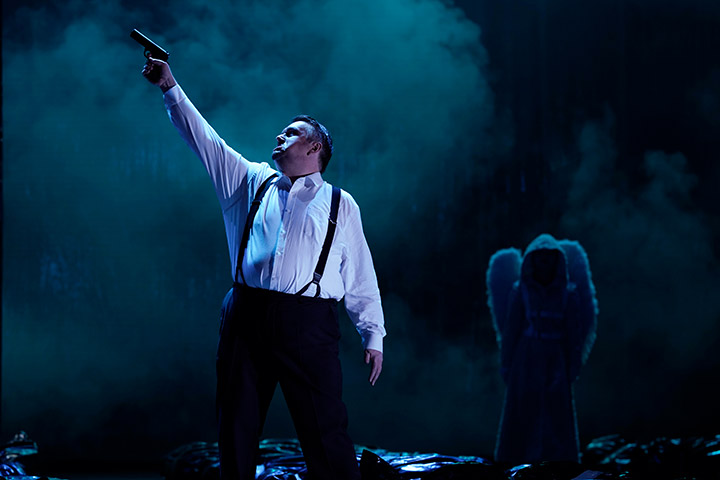Magnificent Four – Il Trovatore in Landestheater Linz 11.01.2020
Il trovatore
Giuseppe Verdi
prima assoluta il 19 gennaio 1853
al Teatro Apollo di Roma
Conductor: Enrico Calesso
Staging: Gregor Horres
- Manrico: Sung-Kyu Park
- Leonora: Izabela Matuła
- Count di Luna: Federico Longhi
- Azucena: Katherine Lerner
- Ferrando: Dominik Nekel
- Ines: Gotho Griesmeier
- Ruiz: Csaba Grünfelder
- an old gipsy: Markus Raab
- A messanger: Domen Fajfar
Sets and costumes: Jan Bammes
Video: Volker Köster
Responsible for the choir: Elena Pierini
Extra-choir: Martin Zeller
The Bruckner Orchester, Linz
Choir and extra-choir of the Landestheater Linz
What makes a good Il Trovatore? It is very simple: the four best singers in the world – the most popular and precise recipe by Enrico Caruso has never lost its value. Years ahead, after introducing unimaginable technologies to the theatre, dragging the story through all kinds of time and space experiments, Il Trovatore remains the same milestone! Despite a little unclear, unfortunate plot, it is still a collection of the most precious jewels of the opera history. And it does take four absolutely fabulous singers to bring it to the heart of the public. The new production of Il Trovatore of the Landestheater Linz had at least three outstanding protagonists (Federico Longhi, Izabela Matuła and Sung-Kyu Park) and to make it a magnificent four – we can add a perfect ingredient: conductor Enrico Calesso!
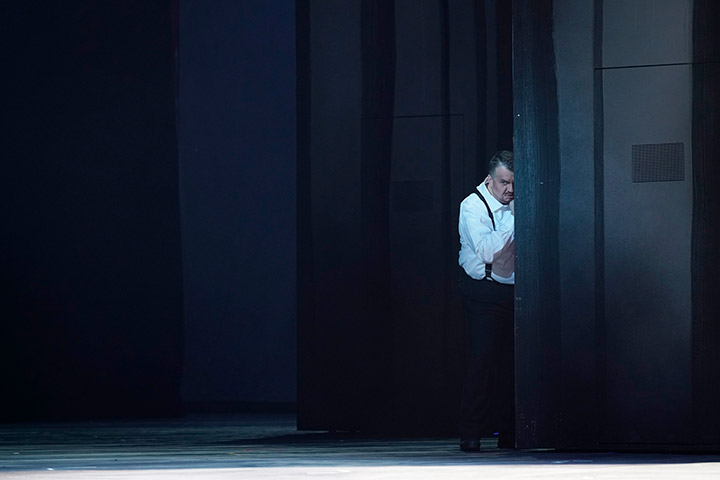
The production of the Landestheater Linz, directed by Gregor Horres, is simple, but effective. Rather modern settings of war-lord Conte di Luna and vagabond Azucena, include some spiritual elements – like two figures of dark and white angels and a terrifying figure of a dead child (the real son of Azucena). Also simply resolved settings (stage and costume design by Jan Bammes) work very intensely due to an effective video projection (by Volker Köster). The functional staging – without too much scrutiny – just creates a dark and morbid atmosphere for the double tragedy, where the violence in the past gives birth to more violence in the future, consuming short and unfulfilled lives of innocent children, lovers, etc. …and black and white angels come to haunt their souls!
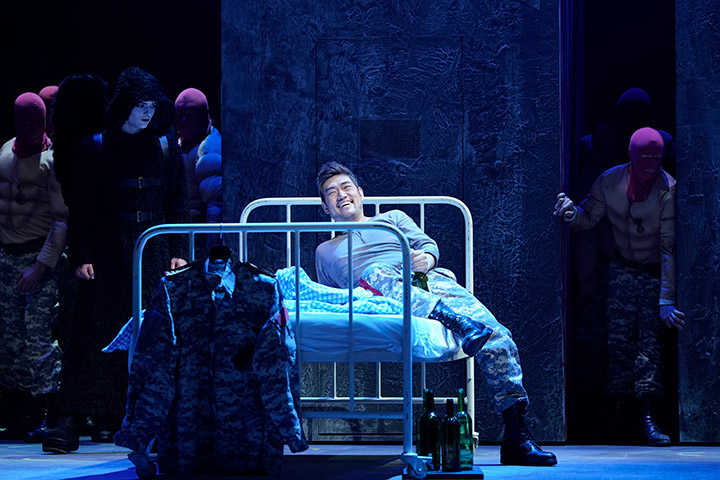
The show works! And gives an adequate space to music, which is essential to the opera (and unfortunately, many contemporary producers completely miss this point) Starting from the orchestra: excellent Bruckner Orchestra is on its top! Maestro Enrico Calesso manages to construct a beautiful flow of the sound, full of dynamic contrasts and colorations: from almost “cameristic” lightness to tragic brilliance – typically, an undoubted strength of the Bruckner Orchestra! Worth mentioning a perfect syntony between singers and the orchestra: Enrico Calesso find tasteful and elegant resolution for each individual interpretation without losing the focus of the homogeneous flow of the opera. Excellent work with the Landestheater choir (prepared by Elena Pierini) and extra-choir too!
Il Trovatore is the singers’ opera! Without doubt, Verdi’s one of the most demanding and dangerous creations, where the soloists really display their strength and weaknesses! In most of the cases the producers of Il Trovatore in Linz made excellent choices: soloists ensemble is well balanced and consists of some exceptionally talented professionals.
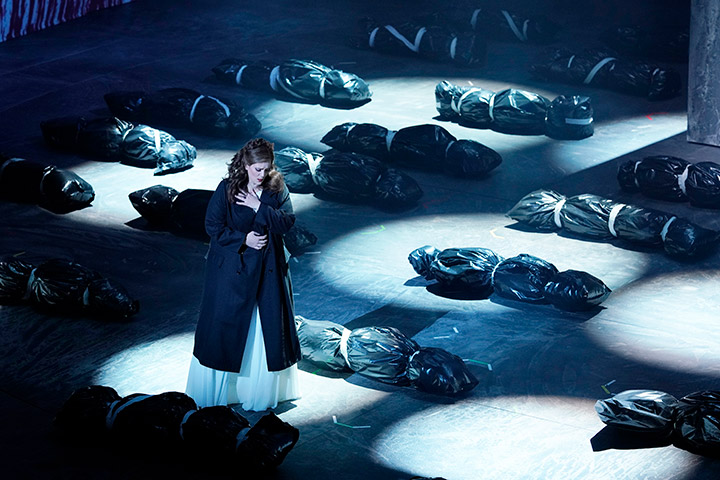
Sung-Kyu Park in the title-role of the troubadour Manrico was convincing. He knew very well his strength, as well as his limits and constructed his character in a very intelligent manner. He had all it takes – pleasant voice, reliable range, ability to diversify very demanding musical moments: in his famous aria “Ah si, ben mio” he displayed his lyric color and gained spinto colorations in the second part “Di quella pira”, concluding it with a long and steady high C – the guarantee of success and well deserved applause!
Beautiful performance delivered Izabela Matuła as Leonora. Blessed with a very big and beautiful voice, she resolved very well her first act aria and cabaletta – “Tacea la notte placida”. But the most of her exceptional qualities she showed in her great scene in the IV act. “D’amor sull’ali rosee” sung with the beautiful legato, accompanied by emotional “Miserere” and virtuously sung cabaletta “tu vedrai che amore in terra”. She took a lot of freedom in her performance, but brilliant control of Maestro Calesso over the orchestra made it possible and convincing, without damaging the flow of Verdi’s masterpiece.
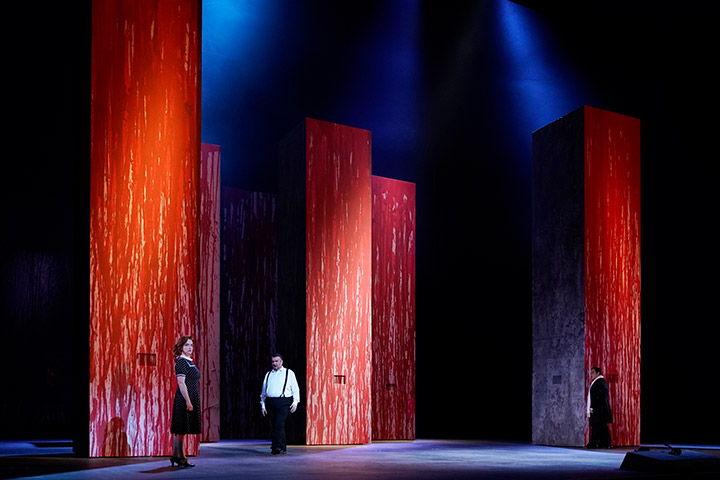
The third important protagonist, Federico Longhi – as Conte di Luna was a real moto of the performance. He stood out from the slight rigidity of the performance by breathing life in each word and phrase. His character, controversial and tragic in its own way – was the most complete: restlessness and brutality in his rage for the revenge and conquest for the desired woman; on the other hand, immense tenderness in his great and extremely difficult aria “Il balen del suo sorriso”, performed with an exquisite vocal control and a deep artistry. With this debut he definitely proved himself as one of the best authentic Verdi baritones.
Not a very successful choice of Azucena – mezzo soprano Katherine Lerner, although in possession of an important voice, she was not technically prepared to upfront this demanding role.
Solid performance delivered by the bass Dominik Nekel: important voice and good artistic skills well displayed in his aria in the first act. Among secondary characters worth mentioning very interesting singer Csaba Grünfelder as Ruiz. The cast completed soprano Gotho Griesmeier as Ines, Markus Raab as an old Gipsy and Domen Fajfar – as a messanger.


